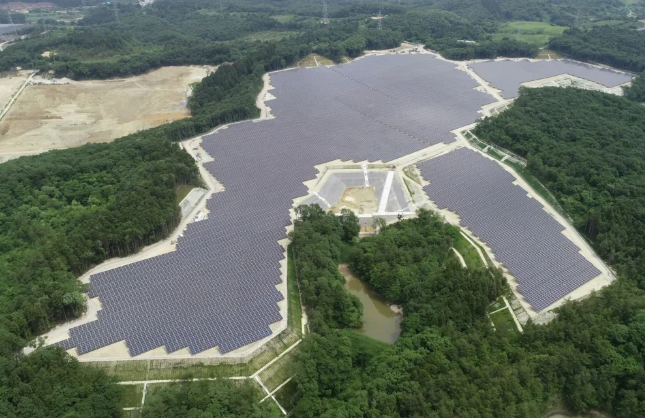

Three years into the third decade of the 21st century and we are yet to catch our breath. Covid still poses problems, conflict in Europe shows little sign of concluding, and the need to properly address climate change grows ever more urgent.
“We stand at an inflection point,” says Vinod Mukani, global head of infrastructure and power finance at Nomura. “We have achieved remarkable economic progress, resulting in a smaller, more connected world. But this has also accelerated challenges that we are now acutely aware off, whether it’s climate change or managing global energy demand.”
Getting “amped” about green energy
When faced with such tests, it’s important to confront them head-on – and within adversity exists opportunity. Mukani oversees a business that supports some of the world’s most influential asset owners in managing assets that address the impact of a warming world or tackle urgent energy security.
A perfect example of this is Nomura’s relationship with renewable energy developer Amp Energy. Last year, Amp Energy announced the successful close of a $350m cross-border credit facility with a consortium of high-profile investors, including a sovereign wealth fund.
Nomura was the sole lead arranger of the facility designed to support Amp Energy’s global battery storage asset portfolio. The investment, which could increase to $700m, is being used initially to support the funding of these assets in the US, Australia and Japan.
The deal is a perfect example where Nomura is taking on and distributing risks into the market to ensure projects come to life when conventional financing markets are not available.
“You must have the mindset to make infrastructure assets bankable,” says Mukani. “A lot of these assets don’t see the light of day because they’re simply not bankable in a traditional sense. Nomura looks at these opportunities differently and has the intellectual capacity to explain the risks to our clients.”
With more than 25 years of experience in project finance in the energy and infrastructure sectors, Mukani has formed a philosophy he believes Nomura exemplifies: “You need a truly global platform that can tap liquidity anywhere; you need to have the products and services to be nimble and dynamic; and, finally, you need flawless execution.”
Mukani flags Nomura’s involvement as a co-financing partner in the acquisition of a 400MW operational utility-scale solar portfolio by Enfinity Global, an investor, owner, operator and developer of renewable energy assets.
Completed in September, Enfinity Global agreed to acquire a portfolio consisting of 28 operational solar plants located in the US from Capital Dynamics. The deal should generate EBITDA of approximately $45m a year. At the time of the acquisition, Enfinity Global had an existing portfolio of over 7GW of power plants in various stages of operations and development.
The portfolio produces 1,175GW/h of clean electricity per year, enough to power up to 64,000 US households and offset 508,000 tonnes of CO2 emissions, which is equivalent to taking 110,000 cars off the road.
That deal came on the back of acquiring a 250MW solar project portfolio in Japan for an enterprise value of $1b last year in which Nomura acted as the sole lead arranger and bookrunner for project financings in the portfolio.
Such deals not only reflect the increasing demand for renewables but also the importance of Nomura’s market understanding and positioning to capitalise.
Renewables will soon dominate
For those still in doubt, an analysis by Carbon Brief of figures in the International Energy Agency (IEA) electricity market report 2023 shows that renewables, combined with nuclear power, will comfortably cover growth in electricity demand between now and 2025.
If correct, it means clean energy sources will soon displace fossil fuels. As part of that transition, China will account for a third of global electricity demand by 2025, up from 25% in 2015. Within the same time frame, the IEA expects Asia will make up more than half of global electricity demand.
In step with huge generational shifts in energy consumption and demand, Russia’s invasion of Ukraine created an urgent need to tackle energy security and independence.
“So, all of a sudden, asset owners are focused on building renewable assets, renewable power generation projects,” remarks Mukani. “In Italy, for example, we are spending time with these asset owners to find a capital solution to reduce dependence on gas imported from Russia.
“You need to find a way to get [renewable] assets into the ground and make sure procurement challenges don’t impact the construction of these assets, while also ensuring you are managing financial markets risks, such as interest rates, something that if not done sufficiently would affect the viability of a project and investment.”
Nomura was joint lead arranger and bookrunner on a $1bn debt package for the pre-construction work of a liquefaction and export facility with an ultimate capacity of 20 million tonnes per annum in Plaquemines Parish, Louisiana. The project site is located on the Mississippi River, which provides deep-water access without the need for dredging, allowing for an environmentally friendly development process. The liquefied natural gas produced is a cleaner-burning fuel relative to coal and oil, and will be exported globally to Europe and Asia.
“The internationally exported cargos will expedite the global transition from carbon-intensive fuels to cleaner natural gas and spur the transition to a low-carbon economy,” said Mukani.
Getting into green hydrogen
Another area with big potential is green hydrogen. And it has sparked more interest since the Biden administration signed the Inflation Reduction (IRA) Act into law.
“For green hydrogen to be successful you need the right investment and policy support,” says Mukani. “In the US, the IRA makes it economical to develop green hydrogen projects because there is a subsidy that makes that investment viable.”
McKinsey is certainly bullish about its potential. Based on the current trajectory, the consultant predicts clean hydrogen could help abate seven gigatonnes of CO2 emissions annually by 2050 – equivalent to roughly 20% of human-driven emissions. Used in conjunction with other solutions, such as renewables and biofuels, McKinsey has stressed hydrogen’s potential to decarbonise carbon-intensive sectors such as maritime shipping and aviation.
Despite the many new challenges we face today, infrastructure and power investment have long proved themselves resilient to handling complexity. Many of the fundamental issues of getting a huge project up and running remain exactly the same, irrespective of the energy source in question. For banks like Nomura, it’s about ensuring it adds value by making a project both bankable and investable.
“The science tells us that we need more renewable projects to defeat climate change,” says Mukani. “By devising innovative structures, creating liquidity and generating demand for the asset in question, we can help lower the infrastructure cost and accelerate the green transition”







